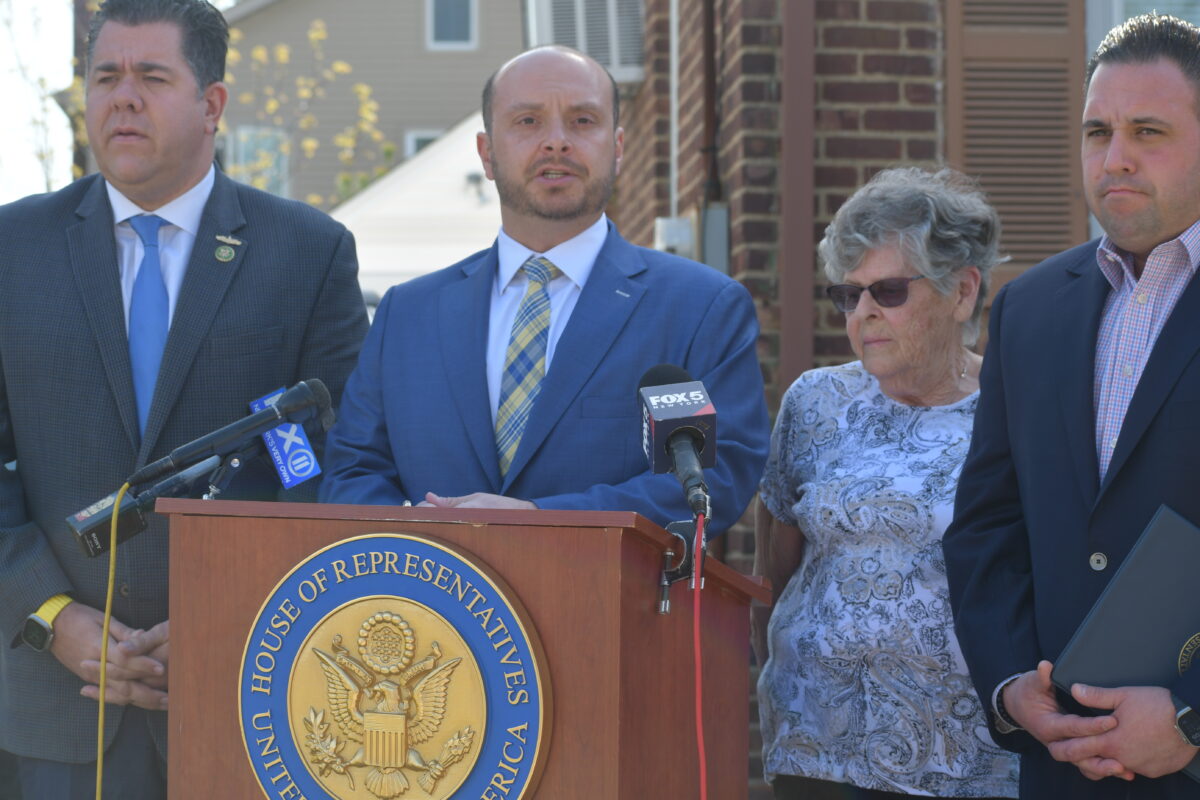
A trio of Long Island Republican congressmen on Friday announced bipartisan legislation to repeal the cap on the State and Local Tax deduction — known as SALT — a move that could amount to significant federal tax savings for Long Islanders with high property taxes.
Representative Nick LaLota of Amityville, whose district includes the South Fork, joined Representative Andrew Garbarino of Bayport, a co-chair of the Congressional SALT Caucus, and Anthony D’Esposito of Island Park, a caucus vice chair, in the driveway of a Franklin Square home to unveil the SALT Deductibility Act, a new attempt at passing legislation to eliminate the $10,000 limit on the tax deduction.
“This cap has financially devastated so many of our constituents and those in communities across the country,” Garbarino said. “As co-chair and founder of the Congressional SALT Caucus, I am committed to righting this wrong.”
By repealing the cap imposed by the Tax Cuts and Jobs Act in 2017, the legislation would permit Long Islanders to once again deduct all of their property taxes and state income tax on their federal tax returns.
“Long Islanders pay some of the highest property taxes in the country, and for the hardworking families in my district and all over Long Island, the $10,000 cap means they are only able to deduct a portion of their real property taxes and income taxes,” Garbarino said.
He pointed out that New York is a donor state, meaning the state’s taxpayers send more money to Washington, D.C., in federal taxes than they get back in benefits.
New York has the “dubious distinction” of leading the country in outmigration and the highest tax burden, LaLota said, adding that this legislation would make the burden a little bit lighter.
According to WalletHub, New York’s tax burden — considering property tax, income tax and sales tax — is 12.47 percent. Next on the list is Hawaii at 12.31 percent followed by Maine at 11.14 percent.
LaLota also suggested state leaders should be working to lower state income taxes and local leaders should be doing the same for local taxes.
“We’re sick of seeing our neighbors leaving for lower tax states like Florida, whose overall tax burden is just 6.33 percent, almost half of what the burden is here in New York State,” LaLota said. “… We all want to stay here, and we’re working to make it more affordable for our fellow Long Islanders.”
D’Esposito added: “Those of us behind this podium will fight hard to ensure the SALT cap is repealed and New York neighbors are once again treated fairly by the federal government.”
Garbarino is the prime sponsor of the legislation, which has 45 co-sponsors, including 38 Democrats and seven Republicans. If adopted, the repeal would be effective December 31, 2022, so taxpayers would realize the savings next year when filing their 2023 federal tax returns. Tax filers who stand to benefit pay more than $10,000 in state and local taxes annually and can claim more than the standard deduction, which is $13,850 for single filers and $27,700 for couples.
The SALT Caucus relaunched in February with 33 members hailing from California, New York, Maryland, New Jersey, Illinois, Minnesota, Connecticut — some of the states with the highest taxes in the country — as well as the District of Columbia.
Since 2019, the U.S. House of Representatives has passed legislation to repeal the SALT cap three times, though the Senate has not acted on any of the bills.
Last month, Republican Senator Susan Collins of Maine introduced legislation that would double the deduction for married couples. Currently, the deduction is capped at $10,000 for both single filers and couples.
“We should not create a situation where married couples would have been better off financially were they not married,” Collins said in a statement last month. “The SALT Deduction Fairness Act would ensure that limits on SALT deductions do not disproportionately and unfairly penalize married filers by simply doubling the deduction to $20,000 for married filers.”